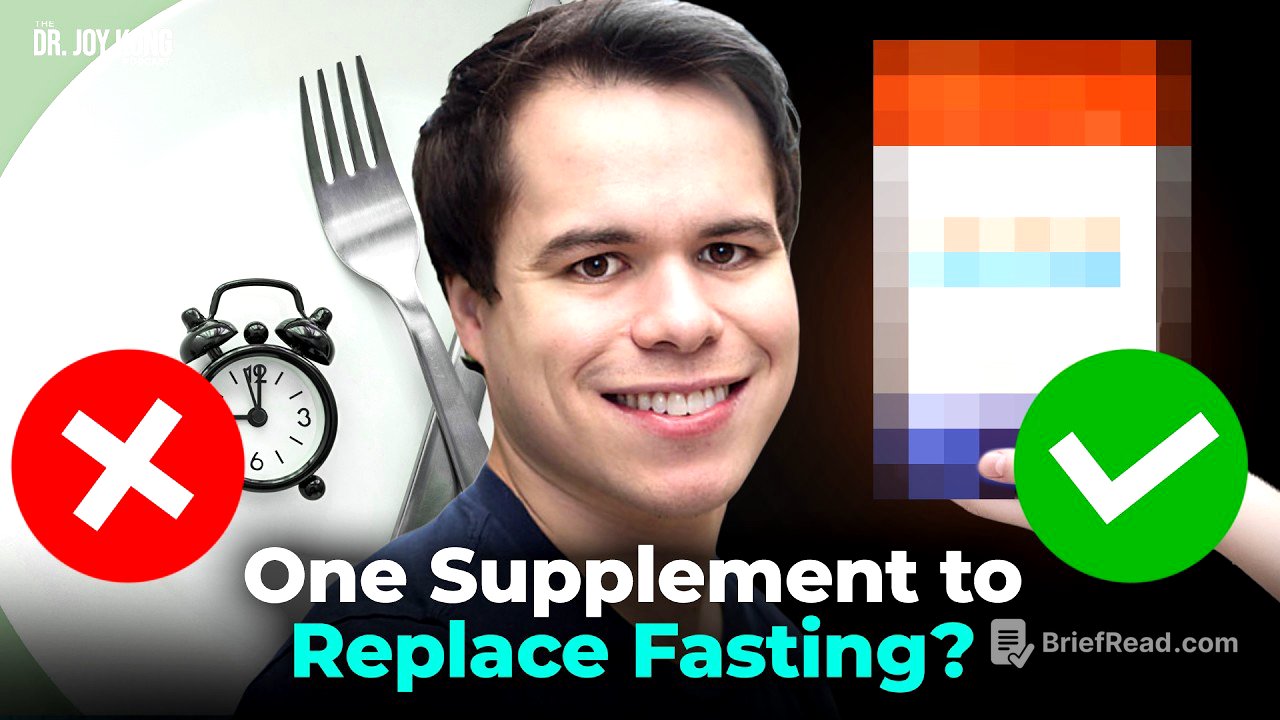TLDR;
Dr. Chris Rodes, a nutritional biochemistry expert, discusses intermittent fasting and his research on mimicking its benefits through supplementation. He explains the science behind fasting, the optimal duration for health benefits, and the development of a supplement called Mimo that replicates the positive effects of fasting without requiring dietary restriction. The conversation also covers various nutritional topics, including the role of carbohydrates and protein in diet and longevity.
- Intermittent fasting for 20-36 hours is more effective than shorter periods like 16/8.
- Prolonged fasting can reset the immune system and benefit autoimmune disorders and cancer treatment.
- Mimo, a supplement containing nicotinamide, spermidine, OEA, and PEA, mimics the anti-inflammatory, antioxidant, and cardioprotective effects of fasting.
- Individual nutritional needs vary, and it's essential to find a balanced diet that works for one's lifestyle and health goals.
Introduction to Intermittent Fasting [0:00]
Dr. Joy Kong introduces Dr. Chris Rodes, a nutritional biochemistry expert, to discuss his groundbreaking work on intermittent fasting and its impact on health and longevity. Dr. Rodes explains his initial interest in intermittent fasting, driven by the idea of activating the body's dormant longevity bio-program without external interventions. This fascination led him to research and uncover the mechanisms behind fasting's beneficial effects.
Defining Intermittent Fasting [3:21]
Dr. Rodes clarifies the definition of intermittent fasting, noting the variability in the field. He explains that to truly enter fasting metabolism, one needs to abstain from food for 20 to 24 hours to deplete glycogen stores and switch to lipid metabolism and ketone production. The popular 16/8 fasting method may not provide significant benefits beyond caloric restriction, as it typically doesn't allow the body to reach the metabolic state necessary for immune cell regulation, autophagy, and lifespan extension.
Prolonged Fasting and Its Benefits [5:36]
Prolonged fasting, lasting multiple days or weeks, can trigger later-stage benefits such as autophagy and immune cell reset. Around 72 hours of fasting, the immune system undergoes a reset, eliminating unnecessary autoreactive cells and regenerating from stem cells, which can be beneficial for individuals with autoimmune disorders. Medically supervised prolonged fasting can provide symptom relief for autoimmune diseases and aid in cancer treatment by sensitising cancer cells while maintaining host cell stability.
Research on 36-Hour Fasting [7:19]
Dr. Rodes discusses his research on 36-hour fasting, chosen because it aligns with literature showing lifespan extension through alternate-day fasting. A study involving 20 participants showed that a 36-hour fast enhanced plasma functionality, making it anti-inflammatory, antioxidant, and cardioprotective. Comprehensive metabolomics revealed over 300 significant molecular differences between the baseline and fasting states, leading to the identification of 24 bioactive targets.
Mimicking Fasting with Metabolites [9:59]
Through further research, Dr. Rodes and his team identified a synergistic combination of four metabolites that could recreate the beneficial effects of fasting. These metabolites—nicotinamide, spermidine, OEA (oleoylethanolamide), and PEA (palmitoylethanolamide)—were shown to extend lifespan by 96% in C. elegans without caloric restriction or fasting. These naturally occurring human metabolites can be used as supplements to activate synergistic pathways within cells, mimicking the benefits of fasting.
Mimo: A Fasting Mimetic Supplement [12:12]
Mimo is a fasting mimetic product that combines nicotinamide, spermidine, OEA, and PEA, naturally occurring molecules found in the food stream. These molecules are extracted from natural sources and formulated into a supplement that replicates the molecular effects of a 36-hour fast. A pilot clinical study showed that Mimo prevented the loss of plasma functionality typically seen after eating and added functional gains, mimicking the effects of fasting even when consuming a standardised breakfast.
Comparing Mimo to Pure Fasting [15:51]
While pure fasting is still more effective, with about a 30-40% difference in specific markers, Mimo can enhance shorter fasts like 16/8 or one-meal-a-day schedules. Mimo contains OEA and PEA, which help suppress appetite, enhance mood, and relieve discomfort, making fasting more tolerable. The goal is to harness the benefits of fasting through these molecules, whether or not one is actively fasting.
Ideal Fasting Length and Supplement Usage [18:35]
The ideal fasting length for human longevity is still under research, but animal studies suggest alternate-day fasting (36-hour cycles) is effective. Mimo can be taken on eating days or during the initial stages of fasting to enhance benefits and ease the transition. There is no need to cycle on and off Mimo, as the body naturally metabolises and utilises these human molecules safely.
Mimo vs. Fasting Mimicking Diet [26:19]
The fasting mimicking diet involves a 5-day program with severe caloric restriction (700-1000 calories per day) using specially engineered foods to maintain a fasted state. Mimo, on the other hand, is not a diet but a supplement that raises the concentration of bioactive fasting metabolites in the body, activating similar cellular health effects without requiring dietary changes. Mimo recreates fasting at the molecular level through supplementation, offering a simpler and more convenient approach.
Dietary Recommendations While Taking Mimo [28:45]
While specific dietary recommendations cannot be made, Dr. Rodes personally follows principles similar to a paleo diet, focusing on micronutrient density with low caloric density. This involves consuming lean protein with fibrous, low-calorie vegetables and limiting simple or refined carbohydrates. He still practices one meal a day, using Mimo to enhance the benefits and support his lifestyle.
Carbohydrates, Protein, and Individual Nutritional Needs [33:32]
There is nothing inherently wrong with carbohydrates, as they are part of our natural metabolism and convert into glucose, which the brain needs. However, the type and amount of carbohydrates matter, with ultra-processed foods and refined sugars causing potential problems. Limiting calories is crucial for lifespan extension, and overconsumption leads to metabolic disorders. Individual genetic complexity and variations mean that what works for one person may not work for another.
Protein Intake and Longevity [37:25]
While protein is essential, consuming one gram per pound of body weight is excessive. Maximal protein incorporation occurs around 0.8 grams per pound of body weight. High-protein diets can negatively impact longevity by overstimulating growth pathways like mTOR, IGF-1, and growth hormone. Limiting specific amino acids like methionine and branch-chain amino acids can also enhance lifespan. Maintaining muscle mass is crucial for longevity, especially as one ages.
Conclusion and Further Information [41:11]
Dr. Kong expresses excitement about Dr. Rodes's work and its potential benefits. Dr. Rodes encourages those interested to learn more about Mimo and read through clinical studies and scientific information at Mimo Health.









